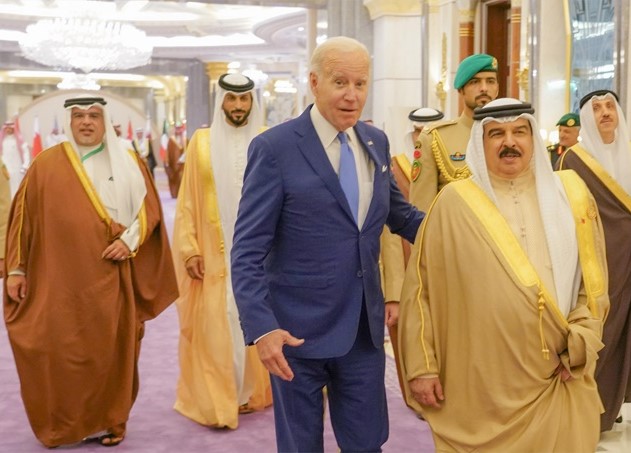The United States has been increasing its focus on the Middle East since World War II. In order to maintain a consistent U.S. Navy presence in the region, the Middle East Force was established in 1949. This allowed for broader engagement, leading to a significant military partnership. In 1971, after Bahrain gained independence from the United Kingdom, an enduring relationship was established between the United States and Bahrain. Through a bilateral agreement with the Bahraini government, the U.S. Navy took control of a former British naval base. Initially, it was named Administrative Support Unit Bahrain, but in 1999, it was transformed into a Naval Support Activity. The establishment of the U.S. Embassy in Manama in 1971, the Bahraini Embassy in Washington, D.C. in 1977, and the military presence in Bahrain are just a few examples of the historic milestones that reflect the strong and dynamic partnership between the two countries.
As of early 2020, the U.S. military presence in Bahrain has exceeded 7,000 personnel, predominantly from the Navy, engaged in diverse missions critical to addressing regional threats. This underscores the bilateral security relationship, which predates Bahrain’s independence and remains central to the United States’ capacity to respond to evolving challenges in the region. Notably, the American Mission Hospital, founded in 1903, is a testament to the enduring humanitarian dimension of the U.S.-Bahrain ties. Bahrain’s formal relations with NATO under the 2004 NATO-GCC “Istanbul Cooperation Initiative” (ICI) further solidify its strategic positioning.
The two nations have recently signed the Comprehensive Security Integration and Prosperity Agreement (C-SIPA), marking a revival in their diplomatic relations. This agreement signifies an elevated level of security and technological collaboration, responding to the shifting dynamics of global geopolitics. As emerging alliances reshape the global power structure, the U.S. and Bahrain find themselves at a crucial juncture, navigating the intricacies of their renewed collaboration.
However, amidst this strategic renaissance, the alliance faces challenges from President Joe Biden’s explicit emphasis on human rights. Bahrain’s human rights practices have been a subject of both U.S. and global criticism, particularly concerning the government’s response to unrest and political opposition. The lack of accountability of security forces, suppression of free expression, and treatment of prisoners are some key concerns. Despite consistent calls from the United States, spanning multiple administrations since the 2011 uprising, for Bahrain to exercise restraint and release jailed opposition leaders, engagement and defense cooperation have continued with minimal changes.
The partnership between Bahrain and the United States involves a complex balance between upholding human rights principles and recognizing Bahrain’s strategic importance. However, the Biden administration’s strategy in aligning with evolving international alliances while safeguarding fundamental human rights values must be thoroughly examined. This analysis delves into the details of the U.S.-Bahrain relationship and explores how promoting human rights intersects with the imperatives of U.S. foreign policy. By doing so, it aims to reveal the challenges and opportunities that shape the current state of U.S.-Bahrain ties. Against the backdrop of changing international alliances and ongoing human rights concerns, this analysis seeks to provide insights into the intricacies of the landscape and the delicate balance required for effective navigation.
Recommendations
The relationship between Bahrain and the United States is deeply rooted in longstanding strategic cooperation, recently solidified through the Comprehensive Security Integration and Prosperity Agreement (C-SIPA). However, this partnership encounters challenges from documented human rights violations within Bahrain. It is crucial to recognize that reinforcing this partnership holds significant strategic implications requiring careful consideration by the Biden administration.
As the Biden administration engages in global diplomacy, the Bahrain partnership becomes a critical case study, emphasizing the complexity of maintaining alliances while advocating for human rights globally. This case underscores the delicate balance between geopolitical interests and ethical responsibilities in shaping foreign policy, reflecting the nuanced landscape of contemporary international relations.
Bahrain strategically leverages its economic growth to enhance its reputation and public image, attempting to divert attention from a poor human rights record. Despite U.S. declarations of support for global human rights, geopolitical concerns often outweigh ideals in its policy towards Bahrain. Almost 15 years after Bahrain’s Arab Spring uprising, leaders remain in exile or behind bars.
In light of these considerations, we recommend considering the following for U.S. foreign policy toward Bahrain:
- Condemn the ongoing human rights violations by the Bahraini authorities and security forces, including the use of violence, the ban on all forms of protest, and the arrest and detention of peaceful protesters exercising their rights to freedom of expression and peaceful assembly.
- Call on the Bahraini authorities to consider accountability for past violations as a key element on the path towards justice and genuine reconciliation, which are deemed necessary for social stability.
- Advocate for releasing all individuals imprisoned in Bahrain solely for peacefully exercising their rights to freedom of expression, peaceful assembly, and association.
- Exert pressure on Bahrain to cease the use of torture and other ill-treatment, fostering a culture of accountability by establishing effective mechanisms for victims of abuses to obtain justice and remedies.
- Urge Bahrain’s government to take genuine steps towards justice reform and restoring human rights and the rule of law within the country.
- Urge the U.S. to ensure that human rights are mainstreamed across all areas of cooperation with Bahrain. This emphasizes incorporating human rights considerations into various facets of the bilateral relationship between the two nations.
To read the full report, click here: Ethical Dilemmas in Diplomacy The Biden Administration and Bahrain’s Human Rights





